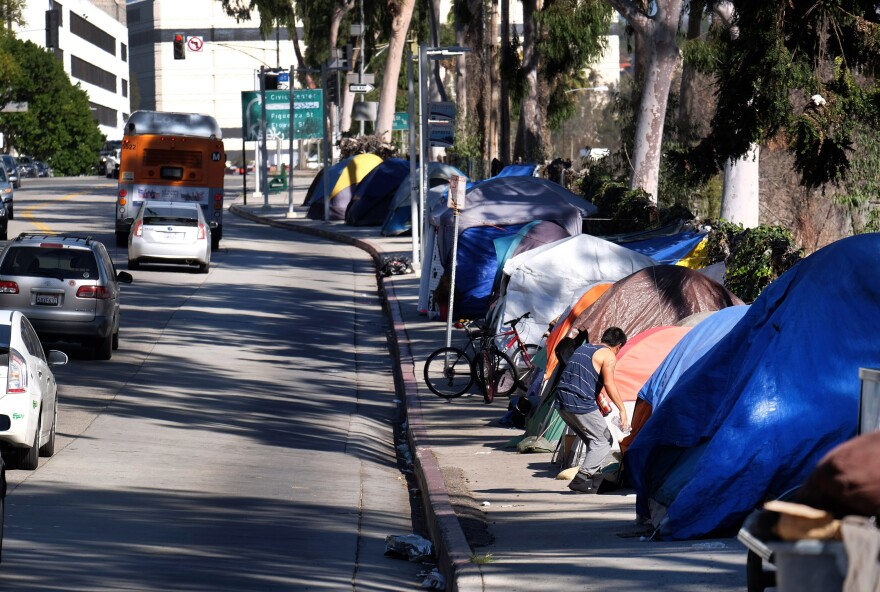This story is free to read because readers choose to support LAist. If you find value in independent local reporting, make a donation to power our newsroom today.
This archival content was originally written for and published on KPCC.org. Keep in mind that links and images may no longer work — and references may be outdated.
LA voted to fund housing for homeless. Now what?

Voters in the City of L.A. Tuesday voted overwhelmingly to invest $1.2 billion in building housing for the city's homeless population — a big step, city officials said, towards solving the growing homeless problem.
At the polls Tuesday night, Catherine Robles was among the 76 percent of voters to support the measure when she cast her ballot in San Pedro.
"I am home-bred here and have been on this earth for 54 years in this community, and I have never seen homelessness like this," she said. "Definitely I think there's some things that need to be addressed."
Measure HHH is considered a first step of many in attacking the countywide homeless problem. The bond is expected to provide the seed money for private developers who construct housing for very low income populations. The rest of the money for such developments generally comes from bank loans, federal and state funds and private sources.
All in all, officials expect the money to cover 10,000 units of housing, to be constructed over the next decade. What that housing will look like, where it'll be constructed, and who will get first dibs are somewhat open questions.
Miguel Santana, L.A.'s chief administrative officer said the city has about a dozen properties it owns that could potentially be used as development sites.
"Parking lots that are underutilized, they're vacant fire stations, they're properties that are not being maximized," Santana said. "We're also looking at properties like motels, for example, which often are nuisance sites throughout the neighborhood."
The buildings themselves, he said, should look like any other apartment structure in the city—which should hopefully entice neighborhoods to welcome the developments.
"There are such units all over the city today and most neighbors would have any idea that they're housing for the (formerly) homeless," he said.
The city will use its coordinated entry system, which identifies the most ill and needy homeless, to determine who gets housing first.
Elise Buik, president and CEO of the United Way of Greater L.A., which helped craft the measure, said she was "thrilled" at the vote outcome. The organization first started looking to get such a proposal on the ballot a decade ago.
"It was a very different political time, homelessness was not a big topic," she said. "The visibility of the issue has brought it to the forefront."
Buik said while she's excited about the step, the group is already looking forward to the March 2017 elections, when L.A. County leaders may put forward their own measure, aimed at funding services for homeless.
The Board of Supervisors considered several options for the November ballot, including a quarter-cent sales tax, but fell short of the four out of five needed votes. Tuesday's election culminated with two of those supervisor seats changing hands, due to term limits. Those supervisors who remain on the board, Mark Ridley-Thomas, Sheila Kuehl, and Hilda Solis all supported a sales tax. The two newly-elected supervisors Katherine Barger and Janice Hahn have not committed to a sales tax measure.
The supervisors are expected to take up the issue at their Dec. 6 meeting, which is their last opportunity to approve a measure for the March ballot. The new supervisors assume office Dec. 5.
"I think it's very critical that the county component comes in," Buik said. "The service side is what makes this model work."
A point-in-time count conducted in January found about 47,000 homeless in the county, roughly 30 percent of them considered "chronically homeless," meaning someone who's been on the streets a long time and has some sort of disabling condition.
About 40 percent are physically disabled, nearly half have substance abuse issues, and about 60 percent suffer from mental illness.
Buik said the United Way will also be monitoring any changes to federal funding for things like affordable housing, social safety net institutions and rental vouchers in the coming year.
For now, however, the coalition that worked for the housing measure is celebrating.
"It says a lot about the hearts and minds of Angelenos that we're a caring community, that we're very concerned about the disparity that we're seeing between the incredible growth in the economy right now and those who are being left behind," Santana said. "That we can't just let one sector of the community to fall so behind that living in the street becomes something that is normal."







